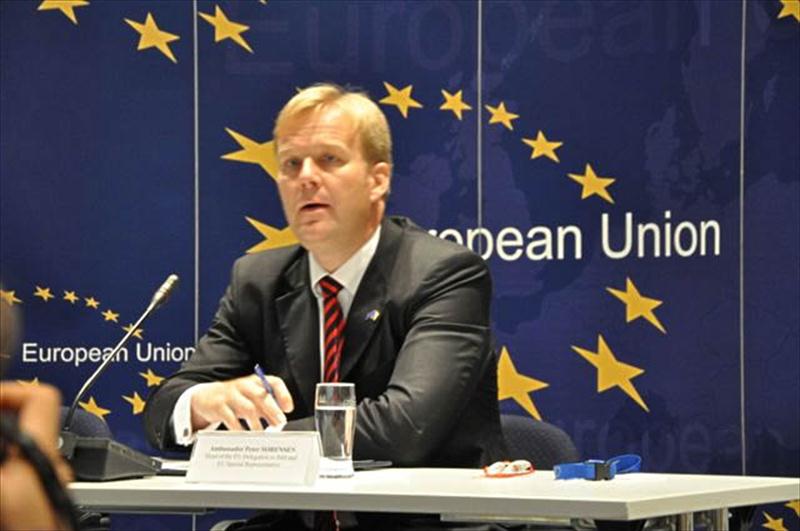By Ambassador Peter Sorensen, Head of the Delegation of the European Union to Bosnia and Herzegovina and European Union Special Representative
Political life in Bosnia and Herzegovina has resumed after the summer break, and it has brought some new faces to the country. I am one of them – last Friday I presented my credentials as the Head of the EU Delegation and EU Special Representative to the Chairman of the Presidency of Bosnia and Herzegovina.
The protocol naturally grabs the headlines – pictures of handshakes and flags have been on the front page. That’s normal. But as I said to my senior staff when we met for the first time in the office last week: we have to be clear about what we are here for. Let me share some of our thoughts.
I want to assure you that I and my staff are here because the Member States of the EU are strongly committed to the goal of a sovereign and united Bosnia and Herzegovina integrated into the Union. The country’s EU perspective is real, but it needs to accelerate. As in my favourite sport, handball, you cannot be a player by sitting on the bench forever and perhaps Bosnia and Herzegovina is at risk of doing that – especially given the progress being made by other countries in the region.
An important point first. There is a leading role for all of you – citizens, authorities, media, civil society – in achieving EU membership for Bosnia and Herzegovina. A common effort by everyone is essential. Neither my office nor the 27 Member States can or will substitute for the proper role of you and your leaders. That’s why I have defined ‘partnership’ as one of the key words of our common work. We will always work in partnership with the authorities at the different levels, as well as with representatives in society at large.
There is a real and concrete agenda of work for and in Bosnia and Herzegovina. That work plan is set out in the Conclusions of the Council of the European Union of 21 March 2011. It is an important guide for me and for my team. It should be an important guide for anyone in a position of responsibility in this country and for every supporter of its European destiny.
There are some clear priorities to address. I don’t need to remind you of the importance of the need to see formation of a Council of Ministers – the technical mandate of the current Council of Ministers should not go on forever as it does not reflect the results of the most recent elections. The citizens made their choice in the election; now they are entitled to see some results from the political parties.
There have to be credible efforts to follow up the ruling on the Sejdic-Finci case, which deemed Bosnia and Herzegovina to be not compliant with the European Convention on Human Rights. There needs to be an EU-compatible State Aid Law. These two issues and some others will help put into force our ‘contract’ – the EU’s and Bosnia and Herzegovina’s Stabilisation and Association Agreement. This will give a new impulse to our European partnership: it will unlock some EU funding programmes, open up new avenues of co-operation between governments and parliaments, speed up harmonization of laws and rules that regulate business and markets and bring the country closer to becoming a full member of the European Union. We are particularly keen for Bosnia and Herzegovina to be seen as a more attractive business environment in this way.
We are also ready to assist with the population census at state level. This task is crucial not only for the country’s socio-economic development, but also for Bosnia and Herzegovina to be able to respond to any eventual questions on its road to EU accession, an exercise recently completed by Serbia and Montenegro next door. More generally, we want to help ensure that key sectors – the judiciary, the administration, the economy – and key infrastructure are ready for the high demands of EU membership, are competitive and are getting EU financial and technical support.
In order to do all this, the EU has enhanced its presence in Bosnia and Herzegovina under my leadership, making us one of the largest EU delegations in the world.
And again: what are we here for? What does that work plan mean?
We are here because the EU – all 27 members united and with one voice – believe that Bosnia and Herzegovina’s people should have an improved quality of life already whilst preparing to be an eventual member of the European Union. Having ever closer relations with the EU and eventually being part of the single market can deliver that vision.
It’s not going to be easy. It’s going to take time. The brunt of the work will have to be done by you and your politicians. But we are here to help you achieve our common goal – Bosnia and Herzegovina as a member of the European Union.
The Conclusions of the Council of the European Union from 21 March 2011 can be read at:
http://www.consilium.europa.eu/uedocs/cms_Data/docs/pressdata/EN/foraff/120066.pdf




